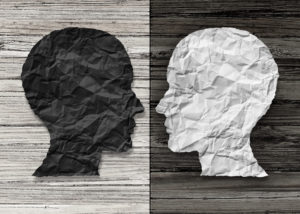Many people who are addicted to drugs and alcohol also have a psychological condition. By the same token, a notable portion of those with mental illness struggle with substance abuse. In the medical community, this is referred to as dual diagnosis (or comorbidity), and effectively overcoming both conditions requires co-occurring disorders treatment.
Thoroughly evaluating a patient and properly diagnosing them with all present conditions is vital for ensuring successful recovery from addiction. Whether a provider is unaware of multiple disorders or merely unqualified to treat both, addressing a substance abuse issue without confronting mental health can jeopardize a person’s chances of recovery and result in a relapse.
Here at Northbound Treatment, we offer a variety of comprehensive rehab plans in Orange County. Our programs are tailored to the needs of our clients, and in many cases, involve dual diagnosis treatment. Are you or someone dear to you facing alcoholism or drug addiction while battling mental illness? Dual diagnosis treatment might be the best route to recovery. Here’s what you should know about rehab for co-occurring disorders.
Why Co-Occurring Disorders Treatment Is Crucial
Many rehab facilities and psychotherapy clinics either aren’t qualified to treat both substance abuse and mental illness or don’t have the capacity. Sometimes, recovering addicts travel back and forth between providers, which can be time-consuming and generally means inpatient rehab won’t work. Also, since essential details and health information are often not relayed between providers, they can’t effectively treat the condition at hand.
In some cases, a person might get sequential treatment, beginning with drug rehab and then transitioning to mental health counseling or vice versa. However, achieving long-term sobriety is a psychological journey in and of itself, so the best healing method focuses on both conditions simultaneously.
Unfortunately, seeing multiple providers for co-occurring disorders is relatively rare. What happens most often is that individuals are treated for only one mental health issue (or none at all). This can create unnecessary obstacles for recovery and even lead to a worsened emotional state. As we mentioned, ignoring a co-occurring disorder can also increase a recovering addict’s risk of relapse.
So, what is dual diagnosis treatment? With an integrated treatment plan like the dual diagnosis program offered by Northbound, all components of care are at one location. Each client has a personalized care team of addiction counselors, therapists, doctors, and counselors. Your team will work with you and coordinate with one another to ensure all aspects pertaining to your recovery are considered. Research suggests that this close coordination among providers is an effective approach for addressing co-occurring disorders[1].
Co-Occurring Disorders Are Common
The prevalence of co-occurring substance abuse and mental health disorders should not be overlooked. With a broad range of diagnosable conditions and forms of substance abuse, there are virtually endless ways in which co-occurring disorders can manifest, providing a variety of dual diagnosis examples. For instance, data shows that people with mental illness have a higher risk of using opioids without a prescription. Also, 43% of those in rehab for prescription narcotics have a co-occurring mental health disorder, most often depression or anxiety[2].
Furthermore, research indicates the more severe a mental illness, the higher a person’s chance of developing alcoholism or a drug addiction. For example, adolescents with severe behavioral issues are seven times more likely to partake in alcohol and drug abuse than those without behavioral problems[2].
That being said, it’s not always easy to determine whether a mental health condition led to substance abuse. In some instances, a severe dependence on drugs can result in temporary or long-term psychological effects. Additionally, addicts don’t always accurately remember (or willingly disclose) when their substance abuse issue started, which can muddle the timeline of which condition arose first. Not only that, but the symptoms of drug dependence and mental illness can mimic each other, making it hard to differentiate between the two.
Most importantly, the fact that co-occurring disorders and substance abuse are so common shines a light on the critical need to screen all patients entering rehab for psychiatric illnesses. Likewise, those seeing a mental health counselor outside of addiction treatment should be assessed for substance abuse and be referred for dual diagnosis care if needed.
Finding Treatment for Co-Occurring Disorders
Despite the high rates of co-occurring disorders and a dire need for dual diagnosis treatment options, only about 18% of rehab centers and 9% of mental health programs are equipped to treat both addiction and mental illness[3]. Consequently, this can make it hard to find the right rehabilitation program.
Northbound Treatment has been helping individuals overcome addiction for over 30 years. We know what works and what doesn’t work, which is why we are an integrated dual diagnosis treatment center. Our full continuum of care includes a detox program, residential rehab, outpatient treatment, and aftercare services. No matter what your starting point is, your addiction and psychological state will hold equal weight at every stage of your journey to recovery.
If you or a loved one are struggling with multiple disorders and are in search of a high-quality treatment program that doesn’t sweep mental health under the rug, we encourage you to reach out. We welcome new clients at our co-occurring disorders treatment centers every day, and we’d love to hear from you. If it turns out Northbound’s rehabilitation center isn’t the right fit, we’ll recommend another facility that’s up to par with our treatment standards.
Northbound’s Approach to Co-Occurring Disorders Treatment
The dedicated team at Northbound advocates for dual diagnosis treatment for many addicts. With decades of experience and research to back it up, we believe it’s the most effective approach to treating co-occurring conditions.
When you enroll in a mental health or addiction treatment program at Northbound, one of the first things we’ll do is a biopsychosocial assessment. The technique takes into account all physical, mental, and socio-environmental factors at play with your addiction. This gives us a clear picture of your situation and potential obstacles to achieving sobriety, which can help us develop the right treatment plan. If a mental health condition is identified during your initial assessment, you’ll be diagnosed with co-occurring disorders and enrolled in our dual diagnosis program.
Our Co-Occurring Disorders Treatment Centers in Orange County
If you’re searching for an accredited rehab program for a dual diagnosis, Northbound’s co-occurring disorders treatment centers are a great place to start. Set in the beautiful Orange County region of Southern California with modern facilities, comfortable accommodations, and a wide range of engaging activities and therapies to choose from, we think you’ll like what we have to offer.
Aside from the unbeatable views and idyllic setting, our curated dual diagnosis program sets clients up for success. With your entire care team and all your appointments at a single location, your recovery will be simplified and less stressful than juggling mental health and substance abuse treatment at multiple clinics. Plus, all providers will be able to access your health information and coordinate care throughout your recovery. And with the support of your sober peers, you’ll have built-in encouragement and accountability when you need it most.
Insurance Coverage for Co-Occurring Conditions
Insurance companies are required to cover substance abuse and mental health treatment at the same level as other essential healthcare services, so there’s a good chance your policy includes some coverage for rehab. Northbound Treatment is an in-network provider for most major insurance plans, and we offer flexible payment options for any out-of-pocket costs. If you need help navigating your policy, fill out our insurance verification form. We’ll review your coverage and provide you with a breakdown of your options.
Personalized Care
While all addiction and mental health treatment programs at Northbound include various evidence-based therapies, there’s no one-size-fits-all approach to recovery. With a unique mental health condition (or a combination of conditions), you need personalized care, which is where dual diagnosis treatment comes in.
Whether your addiction is coupled with major depressive disorder (MDD), anxiety, panic attacks, trauma disorder, PTSD (post-traumatic stress disorder), OCD (obsessive-compulsive disorder), borderline personality disorder, codependency, an eating disorder, or another psychological setback, Northbound has the experience, training, and knowledge to help you overcome it.
Are you ready to reclaim your life? Fill out our online admissions form or call us today at (888) 978-8649 to take the first step.
External sources:










